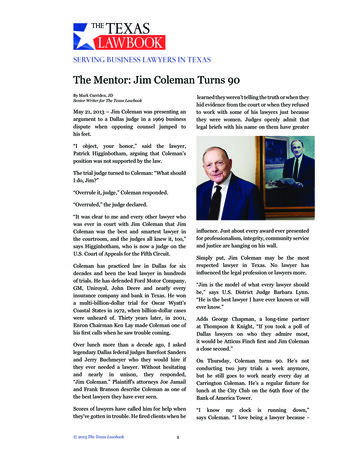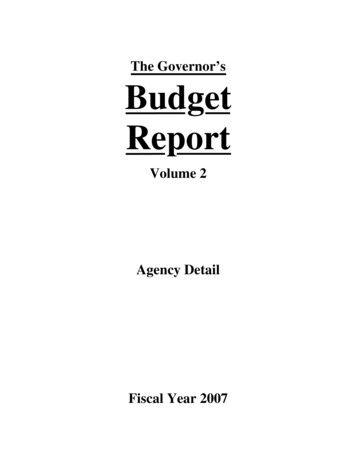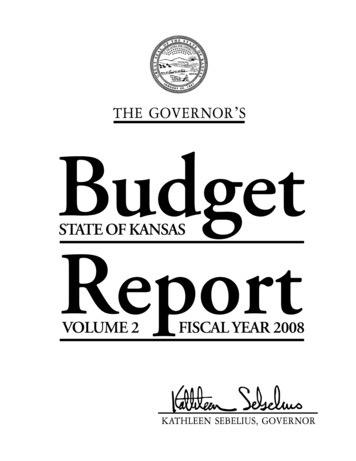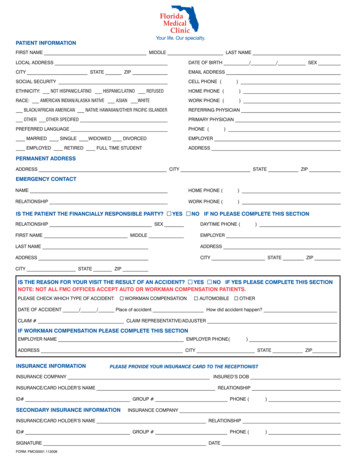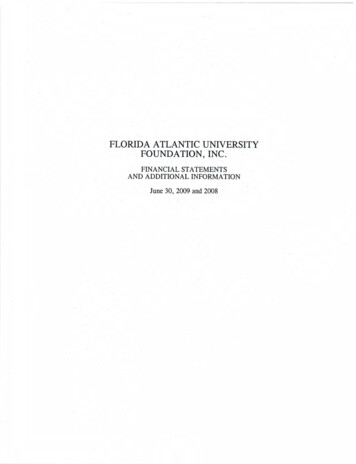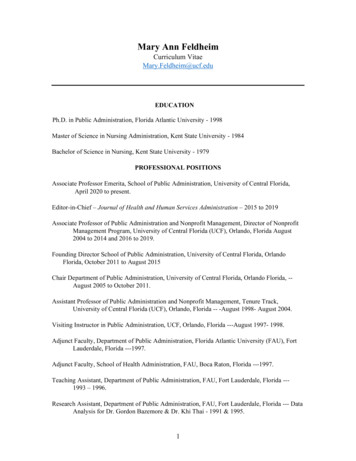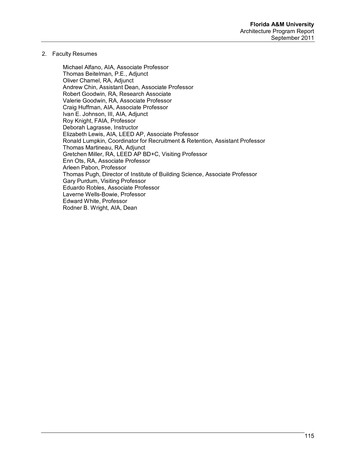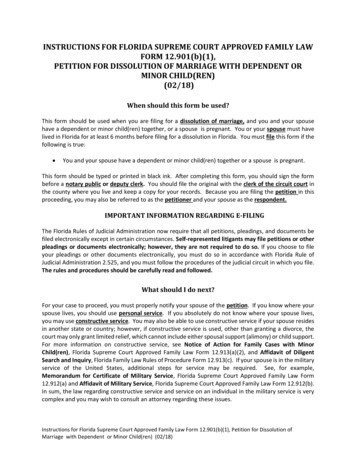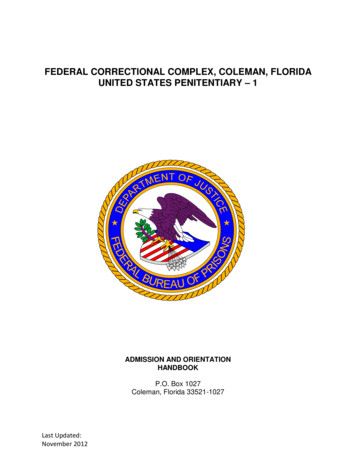
Transcription
FEDERAL CORRECTIONAL COMPLEX, COLEMAN, FLORIDAUNITED STATES PENITENTIARY – 1ADMISSION AND ORIENTATIONHANDBOOKP.O. Box 1027Coleman, Florida 33521-1027Last Updated:November 2012
FCC Coleman, USP-1 Executive StaffMrs. T. Jarvis, WardenMr. Blackmon, Associate WardenMs. L. Lee, Associate WardenMr. B. Behrens, Deputy CaptainFCC Coleman, USP-1 Department Heads/SupervisorsMs. Kleckner - Deputy Case Management CoordinatorVacant - Supervisory ChaplainMr. J. Olson - Assistant Education SupervisorMr. K. Lips- Facilities General ForemanMs. A. Metcalf - Food Service AdministratorMs. Perez - Assistant Health Services AdministratorDr. D. Wennerstrom - Deputy Chief PsychologistMr. A. Clinton - Assistant Supervisor of RecreationMr. J. Boley - Unit Manager 1 A/BMs. T. Padgett - Unit Manager 2 C/DMs. T. Padgett - Unit Manager 3 E/FMr. G. Lee - Unit Manager 4 H/IMr. G. Lee - Unit Manager 5 J/KMr. J. Boley - Unit Manager 6 L/M2
Federal Correctional Complex, Coleman, FloridaUnited States Penitentiary-1Post Office Box 1023 (staff only)Coleman, Florida 33521Telephone (352) 689-6000United StatesPenitentiary - 1Shared ServicesT. Jarvis, Complex Warden – USP-1Human ResourcesFacilitiesFinancial ManagementFood ServicesCharles L. Locket, WardenJ. Pastrana, Warden - MediumW. Bechtold, Warden - LowMr. R. CheathamAssociate WardenCorrectional ServicesFinancial ManagementMs. L. LeeAssociate WardenEmployee ServicesAngel G. MottaAssociate WardenFacilitiesPsychologyFood ServiceAffirmative ActionMr. B. BlackmonAssociate WardenHealth ServicesSafetyMr. B. BehrensDeputy CaptainMr. MorrisAssociate WardenCorrectional ProgramsMr. G. MillerExecutive AssistantPublic Information OfficerMr. B. MoonAssociate WardenUnicorEducationRecreationMr. B. RomeroAssociate WardenReligious ServicesComputer ServicesEmployees ClubInstitution Admission and Orientation Handbook3
USP-1 ColemanOVERVIEWThe Federal Correctional Complex, Coleman, Florida, consists of five separate facilities:Central Administration Building, two high security penitentiaries, a medium securityinstitution with a satellite camp, and a low security institution. Each facility operatesunder the direction of its respective Warden. However, the Wardens and DeputyWardens act in conjunction when making decisions which affect the overall Complex.The following is a general description of duties performed by the administrative staff atUSP-1 Coleman.Warden: The Chief Executive Officer of USP-1 Coleman is responsible for the totaloperation of the institution. The Warden meets frequently with the senior staff membersto review their areas of responsibility and to ensure compliance with Bureau of Prisonspolicies. The Warden evaluates the advice of various committees appointed and hasfinal approval on all institution operations and programs. His decisions are based uponpolicies established by the BOP. While being responsible for the total operation, manyresponsibilities are delegated to his Associate Warden. The Warden is vitally interestedin the overall welfare of all inmates at USP-1 Coleman and works very closely with alldepartments to maintain a safe and humane environment.Associate Wardens: Associate Wardens are responsible for the day-to-dayoperations of the departmental areas of Food Service, Correctional Services, UnitManagement, Psychology Services, Religious Services, Recreation, and HealthServices. Associate Wardens also serve as liaisons between this facility and SharedServices department heads.Note: Inmates are encouraged to resolve any issues or problems with the appropriatestaff assigned to that particular department. However, should an inmate feel the needto discuss a problem with the Warden or an Associate Warden, they are free to do sowhen these staff members are present in the dining hall or on the compound.Executive Assistant: The Executive Assistant to the Warden serves as the institutionPublic Information Officer. All requests for media information concerning the institutionor specific inmates are referred to the Executive Assistant for response. The ExecutiveAssistant also serves as the Administrative Remedy Coordinator.The Warden may also request that the Executive Assistant review concerns of inmatesor of interested community members such as families, attorneys, etc.Captain: The Captain is responsible for the security, custody, and protection ofeveryone in the institution. The Captain is concerned with inmate discipline,appearance, and conduct. The Captain is also responsible for all correctionalpersonnel. Any questions concerning these areas should be addressed to the Captain.Lieutenants: Under the direct supervision of the Captain, Lieutenants are responsiblefor the orderly operation of the institution, i.e., security, custody, and investigations.4
They work in conjunction with other departments in monitoring and remedyingbehavioral problems to maintain a safe environment.Case Management Coordinator (CMC): The CMC is responsible for advising theWarden in all unit/case management related areas. The CMC is the coordinator forthe Central Inmate Monitoring System, Financial Responsibility Program, and InmatePerformance Pay Program, and is the supervisor of the Inmate Systems Department.The CMC is also the liaison between the institution and the U.S. Parole Commission.Supervisor of Education: The Supervisor of Education is responsible for theestablishment and operation of education programs. The department provides basicliteracy, general educational development, vocational training, and college courses.Deputy Chief of Psychology Services: The Deputy Chief of Psychology oversees adepartment consisting of psychologists and treatment specialists. Psychology isresponsible for the evaluation and treatment of inmates with adjustment, emotional,drug, and/or mental health problems. Psychology Services also conducts routineevaluations on all inmates admitted to the facility, as well as reviews for inmates housedin Special Housing Unit (SHU). Inmates requesting psychological services shouldsubmit an Inmate Request to Staff Member form (Cop-Out).Health Services Administrator (HSA): The HSA is responsible for formingadministrative policies and programs essential to the operations of the Health ServicesUnit. The HSA also develops effective working relationships with the U.S. PublicHealth Service and private medical agencies. In addition, the HSA is responsible foroverseeing the procurement of medical supplies and medical equipment. An assistantsupervisor is assigned to each institution to manage daily operations.Food Service Administrator (FSA): The FSA is responsible for the planning andpreparation of all meals at the Complex, including supervision of all Food Serviceprograms such as baking, cooking, and meal service. An Assistant Food ServiceAdministrator is assigned to each institution to manage daily operations.Chaplain: The Supervisory Chaplain is responsible for the establishment andoperation of religious programs. The Chaplains are responsible for conductingreligious services for their religious community and coordinating religious services on anequitable basis for all BOP approved religious communities represented at USP-1Coleman. The Chaplains are dedicated to assisting inmates in their spiritualdevelopment, growth, and personally counseling inmates during times of crisis. TheChaplains also regularly consult with the unit teams and are very interested in thevarious programs offered at USP-1 Coleman and in assisting inmates in programs ofself-help.Supervisor of Recreation: The Supervisor of Recreation is responsible for theestablishment and operation of recreational programs. The department providesrecreation facilities and daily programs in a variety of areas including intramuralprograms, classes in the arts, and varsity sports programs. An assistant supervisor isassigned to each institution to manage daily operations.5
Unit Manager: The Unit Manager is the administrative head of the housing unit andoversees all unit programs and activities. The Unit Manager is the Chairperson of theunit team, reviews all team decisions, and chairs the Unit Discipline Committee.Case Manager: The Case Manager is responsible for all casework services andprepares classification materials, progress reports, release plans, correspondence, andother materials relating to the inmate's confinement. He or she is responsible to theUnit Manager on a daily basis and the Case Management Coordinator (a specialistdepartment head who provides technical assistance to unit staff in case managementaffairs) with reference to specialized training and duties. The Case Manager serves asa liaison between the inmate, the administration, and the community.Correctional Counselor: The Counselor provides counseling and guidance forinmates of the unit in areas of institutional adjustment, personal difficulties, and goalsfor the future. He or she plays a leading role in all segments of unit programs. TheCounselor will visit inmate work assignments regularly and is the individual to approachfor daily problems. As a senior staff member, the Counselor provides leadership andguidance to other staff in the unit. The Counselor is responsible for the FinancialResponsibility Program.Unit Secretary: The Unit Secretary performs clerical and administrative duties.Correctional Officer: The Correctional Officers have direct responsibility for theday-to-day supervision of inmates and the enforcement of rules and regulations. Theyhave safety, security, and sanitation responsibilities within the institution. Unit Officersare in regular contact with inmates in units and routinely share information with the UnitTeam. During his/her assignment, Unit Officers are jointly supervised by the UnitManager and the Captain.INTRODUCTIONThe purpose of this handbook is to provide incoming inmates to the USP-1, withgeneral information regarding the institution and the rules and regulations inmates willencounter during confinement. More detailed information on the policies andregulations may be obtained by referring to Bureau of Prisons (BOP) ProgramStatements and Institution Supplements, available in the Law Library or by consulting amember of your Unit Team. In the event any information in this handbook conflictswith BOP Program Statements or Institution Supplements, the policies and regulationsset out in the BOP Program Statements will prevail. Information specific to USP-1Coleman will be made available during the institution's Admission and Orientationprogram. This material will help new inmates understand what they will encounterwhen they enter prison, and assist them in their initial adjustment to institution life.You are expected to conduct yourself as a gentleman, to be courteous to other inmates,to respect authority, to obey all institution regulations, and to follow instructions of allstaff members.INTAKE, CLASSIFICATION, AND THE UNIT TEAMIntake and Orientation: Upon arrival, inmates are screened by case management,medical, and psychology services staff. Inmates are immediately provided with a copy6
of the institution's rules and regulations, which includes information on inmate rightsand responsibilities.Within seven days of your assignment to a Unit, you will complete the Unit portion ofthe Admission and Orientation (A&O) Program. You will meet with the Unit Manager,Counselor, and Case Manager for a review of Unit procedures and expectations. TheUnit Rules and Regulations are posted on the unit bulletin boards and should bereviewed immediately upon your arrival in the unit.Within four weeks of your arrival, you will be placed on callout to attend the Institutionportion of the A&O Program. You will hear lectures by the Warden andrepresentatives of all the departments. You will be provided with informationconcerning the operation of each department at this facility. At the end of the A&OProgram, you will be assigned to a work assignment.Access to Unit Staff: All Bureau of Prisons institutions are organized into a unitmanagement system. A unit is a self-contained inmate living area that includes bothhousing sections and office space for unit staff. Each unit is staffed by a Unit Teamdirectly responsible for those inmates living in that unit. The unit staff offices arelocated in the units so staff and inmates can be accessible to each other. The unitstaff typically includes the Unit Manager, one or more Case Managers, one or moreCounselors, and one Unit Secretary. The Staff Psychologist, Education Advisor, andUnit Officer also are considered to be unit staff, and may participate on the Unit Team.Inmates are assigned to a specific Unit Team. Generally, the resolution of issues ormatters of interest are appropriately initiated with the Unit Team. Unit Team membersare available to assist in many areas, including parole matters, release planning,personal and family problems, counseling, and assistance in setting and attaining goalswhile in prison. Ordinarily, a member of the unit staff will be at the institution weekdaysfrom 6:00am to 9:00pm, and 6:00am to 4:00pm on weekends and holidays.Call-outs and Daily Changes: Call-outs and Daily Changes for the following day aremade available each evening in the housing units. It is your responsibility to checkthese lists daily and report to your call-out assignment at the scheduled time. Failureto comply with this requirement will result in disciplinary action. Daily changes forclassification decisions such as bed changes and work detail changes are alsoavailable.Schedule of Unit Activities and Unit Based Programs: (Step 3.8.1) A Schedule ofUnit Activities and Programs is posted on each unit bulletin board throughout theinstitution to inform you of that particular unit s unit based activities and programsdeveloped and implemented by the Unit Manager.Provisions for Housing Disabled Inmates: (Step 3.8.1b) for those inmates that havedisabilities, see your unit managers for any housing or other needs you feel arenecessary.Articles for Hygiene: (Step 3.8.1e) any inmate who is need of hygiene items, seeyour unit team within the unit you are staying.7
Program Reviews: Ordinarily, inmates attend a Program Review meeting with theirUnit Team every 180 days. These are held by the Unit Team to review classification,work assignment, educational goals, institutional adjustment, etc. In all units,pre-release programming will be emphasized and staff will address concerns aboutreadjustment, current community issues, and educational /vocational opportunities.Family and/or legal representatives should direct questions regarding transfers to theDesignation and Sentence Computation Center at: U.S. Armed Forces ReserveComplex, 346 Marine Forces Drive, Grand Prairie, Texas, 75051.Unscheduled Program Reviews: (Step 1.5.4) Inmates are to submit an InmateRequest to a Staff Member to request an unscheduled review. Inmates must detail thereason for an unscheduled review (i.e., prior to parole hearing, compassionate release,sentence reduction, clemency, pardon, etc.). Once submitted, with the approval of theUnit Manager, an unscheduled review can be conducted. If approved, the inmate willbe given 48 hours’ notice of the requested unscheduled review.Inmate Request to Review Central File: (Step 1.5.4) An inmate who wishes to reviewhis Central File shall submit a request in writing to his/her Case Manager via an InmateRequest to Staff Member. Once the request has been submitted, the respective CaseManager will arrange for the inmate to review his/her file within 15 working days ofreceipt of that request.Team Participation in Parole Hearings: The Case Manager prepares ProgressReports with input from the Unit Team, and compiles other information in the inmate'scentral file for presentation to the U.S. Parole Commission or other appropriateagencies.The inmate's Case Manager will ordinarily be present at the inmate's Parole Hearing.The Case Manager's function at the hearing is to assist the Parole examiners, not as astaff representative for the inmate.Treaty Transfers for Non-U.S. Inmates: Inmates who are not U.S. citizens may beeligible to serve the remainder of their sentence in their home country. This may bepossible for inmates whose country has a formal prisoner exchange treaty with theUnited States. The Unit Team is the source of information about these transfers.Consular Visits: (Step 2.2.2) Once the institution is notified of a consularrepresentative s request to visit with inmates from their respective country, all inmatesfrom that country are placed on the Call-Out to a predetermined area (normally thevisiting room) to visit.Access to Diplomatic Representative: (Step 2.2.2) each of the Units have amemorandum posted on the unit bulletin boards listing the consulates addresses andphone numbers. If you do not see your consulate listed, contact your case managerwho has a detailed listing.Inmate Savings Account: (Step 1.5.6) There are no local banks which authorize aninmate to open a bank account through the mail. Based on government regulations,one must go in person to open an account. However, inmates have the option ofsaving a percentage of the money posted in their account each month, i.e. 5% of8
posted monies will be saved for release. An Inmate Request to Staff Member isneeded to initiate this request. The request will be directed to the Business Managerfor processing.DAILY INMATE LIFESanitation: It is the inmate's responsibility to check his living area immediately afterbeing assigned and to report all damage to the Correctional Officer, Case Manager, orCounselor.An inmate may be held financially liable for any damage to his personalliving area.Each inmate is responsible for making his bed in accordance with regulations prior towork call everyday (including weekends and holidays when he leaves the area) andshoes should be neatly lined under the bed. Each inmate is responsible for sweeping,mopping, removing trash, and cleaning his personal living area. Cardboard boxes andother paper containers are not to be used for storage, due to their combustible nature.Lockers must be neatly arranged inside and out, and all shelving must be neat andclean. Hanging of clothes lines are prohibited in the cells and housing units. Cardboard,cleaning supplies, and buckets are not to be stored or kept in the cells. Lights, windows,and window ledges should not be covered. Nude or sexually explicit pictures as well asmagazine cutouts and photos will not be displayed on the walls or outside inmatelockers.Toothpaste, toothbrushes, combs, razors, and soap are issued by the institution.Inmates may purchase name brand items through the commissary.Personal Property Limits: Items which may be retained by an inmate are limited forsanitation and security reasons. Excess personal property should not be accumulatedas it would constitute a fire hazard or impair staff searches of the living area.Storage Space: Storage space in living units consists of an individual locker. Locksmay be purchased in the institution commissary. Limited space may also be availableunder the bed for shoes. The amount of personal property allowed each inmate islimited to those items which can be neatly and safely placed in the assigned locker.Under no circumstance will any materials be accumulated to the point where theybecome fire, sanitation, security, or housekeeping hazards.Special Purchase Items: Special purchase items will be authorized only to the pointwhere they can be contained in the inmate s individual locker.Legal Materials: Inmates are allowed to maintain legal materials and supplies, not toexceed what can be stored in their locker. Legal lockers are available in the units tostore an excess of legal material needed for a current, active case.Commissary Items: The total value of an inmate's accumulated commissary items(excluding special purchases) will normally be limited to the monthly spending limitation,and no more than can be stored appropriately in the assigned locker.Food Storage: Food items left open create a health hazard. All food items must beproperly sealed at all times and stored in the inmate s locker.9
Letters, Books, Photographs, Newspapers, and Magazines: An inmate will belimited in the number of books, newspapers, and magazines that can be stored in thelocker provided in each room. Nothing is to be tacked, stapled, or taped to any surfacein an inmate s assigned cell.Radios and Watches: An inmate may not own or possess more than one (1)approved radio and/or watch at any one time. Proof of ownership, through appropriateproperty receipts is required. Radios and watches may not have value exceeding theestablished limits. Radios with a tape recorder and/or tape player are not authorized.Only Walkman-type radios are permitted and headphones are required at all times.Inmates may not give any items of value to another inmate, i.e., radio, watch, sneakers,or commissary items.Jewelry: Inmates may have a plain wedding band without stones and an approvedreligious medal.Housing Unit Rules: Unit Officers and Correctional Counselors inspect cells daily.Unit Rules and Regulations are posted on the inmate bulletin boards in each unit.Typical rules include:No items are to be taped or posted on the walls.If the cell is not acceptable, corrective action, including incident reports,can be expected.When inmates are not present in their cell, the door will be closed.Each inmate is responsible for the cleaning and sanitation of his cell.Unit Orderlies ordinarily work 35 hours per week and are responsible forthe unit sanitation. However, everyone is responsible to clean up afterthemselves. Trash and wastebaskets are to be emptied prior to 7:30am eachday.Beds will be made each weekday by 7:30am. On weekends, beds will bemade whenever inmates are awake or gone from the room. At no time willa mattress be removed from a bunk and placed on the floor.Showers will be closed between 8:00am - 4:00pm with the exception of twoshowers open on each side of the unit (Monday - Friday). Inter-unit visitation is not allowed. Inter-cell visitation is allowed inthe units with the door open. Three (3) inmates, including the celloccupant(s), are allowed in a room except during counts.Safety shoes must be worn in designated work areas. This does not includepersonal tennis shoes. Shoes or sneakers are to be worn in the Dining Roomarea. Shower shoes are prohibited in the Dining Room.10
Unit televisions may be viewed according to posted schedules in the unit.Inmates may play cards and approved games during established hours,providing appropriate noise levels are maintained.Smoking Policy: USP-1 Coleman is a tobacco free institution. Smoking is prohibitedthroughout USP-1 Coleman. The use of any and all tobacco products is strictlyprohibited.Wake-up: General wake-up for all inmates is 6:00am. The Lieutenant calls the unitto breakfast on the basis of a rotating schedule. Inmates are given a reasonableamount of time to leave the unit if they desire breakfast.Dress Code: Hats are not to be worn inside the Inmate Dining Room or in thecorridors. The only exceptions are approved religious headwear and Food Serviceworkers who are required to wear headwear. Hats are not to be worn inside with theexception of the housing units.Appropriate inmate dress for the breakfast and noon meals during institution work dayswill be institution issue pants, shirt, and approved work shoes. Approved personalshoes may be worn by inmates in off-duty status. During the evening meals and onweekends and holidays, approved leisure time personal clothing may be worn in thedining room. Sleeveless tops may not be worn in the dining room at any time.NOTE: Proper dress attire - All inmates are required to maintain their personalappearance. Shirts are required to be tucked into their pants Monday-Friday, 7:30 amto 4:00 pm.BUSINESS OFFICE AND INMATE SERVICESCOMMISSARY: The Commissary is a privilege granted to each inmate. FCC Colemanuses fingerprint identification for Commissary sales. Any inmate whose fingerprintscannot be registered will be required to use their identification card in order to shop.The Commissary sales schedule is posted at the Commissary. Inmates areresponsible for knowing their assigned shopping day. Only the Associate Warden orthe Trust Fund Supervisor will authorize an inmate to make a commissary purchase ontheir non-shopping day. Once last call has been announced, the sales unit will remainopen for fifteen minutes; only inmates in line at that time will be served.The current Bureau of Prisons spending limit is 320 per month and 25 per month forFinancial Responsibility (FRP) Refusal. The spending limit revalidation date for eachinmate is determined by the fifth digit of their register number. That number multipliedby three and adding one will be the date the inmate revalidates each month. Forexample, an inmate whose register number is 12345-678 would revalidate on the 16thof each month (5 x 3 1 16).In order to provide a smooth running commissary sales line, please have the followingitems prepared before being served:11
Prepare your list in advance of coming through the line. There will be nochanges or additions to your list once it has been submitted. Bring a pencil along withyou and pay close attention to the posted signs regarding items out of stock. Makesubstitutions if desired before turning in your list. Make sure your name and eight digitinstitutional numbers is on the top of the list. All account balances can be checked using TRUFONE or TRULINCS. Themaximum amount of any order will not exceed 320 including shipping and mark-up.Special Purpose Orders (SPO’s) will not exceed 300 per quarter plus shipping andhandling. An inmate may not have more than (1) one Special Purpose Ordersprocessed per month. Sales are considered final after the inmate accepts the item(s), signs the salesreceipt (if applicable), and leaves the sales window. The commissary does not warrantany merchandise that is sold in the commissary, however, defective warranty items maybe returned to the manufacturers at the inmate’s expense.TRUST FUND LIMITED INMATE COMMUNICATION SYSTEM (TRULINCS): Uponarrival at FCC Coleman, you will be issued a Personal Access Code (PAC) and aPersonal Identification Number (PIN) if you have not previously been issued one. Inorder to log onto TRULINCS, inmates enter their register number, their PAC numberand their PIN number. Inmates maintain their own contact list in TRULINCS for emailcontacts, telephone contacts and regular postal service contacts. There are severalfunctions within TRULINCS: Public Messaging: Inmates can use TRULINCS to send and receive emailmessages with approved contacts. Inmates are charged one TRU-Unit ( .05) perminute while composing, reading or sending emails. Purchase TRU-Units: Inmates may transfer funds from their Commissaryaccount to their TRULINCS account. There is no charge for this service. View Account Transactions: Inmates can view their account activity. There is nocharge for this service. Send Funds (BP-100): Inmates may send funds to outside sources bypreparing a BP-199, printing it, and submitting it to their Unit Team. There is no chargefor this service. Contact List Management: Inmates may have no more than 100 contacts, 30 ofwhich may be telephone contacts and 30 of which may be email contacts. There is nocharge for this service. Inmates housed in a Special Housing Unit will be provided anInmate Contact Request form. Electronic Law Library: Inmates may use the Electronic Law Library (located inEducation) to conduct legal research. There is no charge for this service. However,there is a charge for any documents printed (see below). This feature is also availableto inmates housed in a Special Housing Unit. Staff Messaging: Inmates may use this feature to send electronic InmateRequests to Staff. There is a limit of one per day and this replaces the paper requestspreviously used. There is no charge for this service. Inmates who do not have accessto this feature will still be allowed the use of paper Inmate Requests to Staff. Local Documents: This feature acts as an electronic bulletin board.Notifications, schedules, menus, etc. may be posted in this section. It is the inmate’sresponsibility to be aware of all documents posted in the Local Documents section.12
Mailing Labels: Pre-printed mailing labels must be used on all outgoing postalmail. Any outgoing postal mail without a pre-printed label will be returned to theinmate. Print Services: Inmates are charged 3 TRU-Units ( .15) per page of alldocuments printed with the exception of mailing labels and BP-199s.INMATE TELEPHONES: As stated above, inmates are provided a PAC number.Inmates will also be required to register their voice with the voice recognition systemprior to being able to use the telephone system. When inmates place telephone calls,they will enter their PAC number and state their name when prompted.Note: Inmates that need to register/record their name, please contact the ITS Office,so that we can enable the inmate's telephone account so that he/she will be able toregister/record their voice by dialing 111 and his/her PAC number. If an inmate isunable to record his/her name due to Medical conditions (stroke, voice box etc.)verification will be made by ITS Department prior to the inmate registering.If an inmate’s PAC number is deemed to be compromised, their telephone andTRULINCS accounts will be immediately disabled.If it is determined that negligence on the part of the inmate has compromised theissued PAC number, the inmate will be required to pay a 5 fee before a new PACnumber is issued.Inmates can transfer telephone credits from their Commissary account to theirtelephone account via the telephone. All transferred credits will be immediatelyavailable for use.All calls will be limited to fifteen (15) minutes. There is a thirty (30) minute waitingperiod between calls.Inmates will be allowed to
Executive Assistant: The Executive Assistant to the Warden serves as the institution Public Information Officer. All requests for media information concerning the institution . The purpose of this handbook
